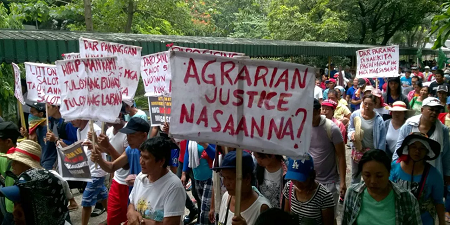HIC-HLRN expresses its solidarity with the nine (eight of them women) peasant leaders of SANAMABASU (Samahan ng Nagkakaisang Mamamayan ng Barangay Sumalo), a Filipino peasant organisation. Today, on International Women’s Day, 8 March 2023, they are staging their "surrender" to the authorities. Since a warrant for their arrest was issued on 21 February, the peasants have temporarily vacated their homes to avoid arrest.
For decades, the peasants of Barangay Sumalo, Hermosa, Bataan, in The Philippines, have been campaigning for recognition of their right to land and their human right to food and nutrition. Their struggle began in 1979, when the wealthy Litton family bought the land they farmed and occupied. Since the introduction of the Comprehensive Agrarian Reform Program (CARP) in 1989, the Litton family has been trying to find ways to exempt their land from the agrarian reform scheme. Even when the land acquisition and distribution was ordered by the Office of the President in 2019, armed guards and pro-Litton family villagers blocked the government`s efforts to survey the land, the first and necessary step in generating and registering the farmers` individual titles.
Amid delayed implementation of the agrarian reform, the Sumalo peasants, their leaders and family members have been victims of harassment, intimidation, criminalisation and even murder. To date, none of the perpetrators have been held to account. According to the peasants` testimonies, the Litton family has filed more than 50 criminal, civil and administrative cases against the Sumalo peasants since they petitioned for agrarian reform. In 2021, an eviction case against them resulted in the demolition of 76 houses, rendering them homeless and deprived of their land and livelihoods.
The recent charges against the nine Sumalo peasants is yet another attempt to silence and demoralise them and weaken their movement and struggle. In July 2022, several individual claimants known to be close to the landowner family filed a case against these nine SANAMABASU members, charging a syndicated estafa, a non-bailable offence of wrongful or criminal deception with the intent to cause financial or personal gain.
Four of the defendants, all women, are older persons, aged 72, 69, 68 and 61 years, respectively. The complainants claimed that the nine accused peasants had conspired to collect money with an alleged promise that they would secure the implementation of agrarian reform to include the Sumalo peasants as agrarian-reform beneficiaries. The nine accused Sumalo peasants deny all allegations.
Today, the Sumalo Nine have decided to "surrender" in defiance of the power and influence wielded by the company owner and the private armed guards at the local level. In doing so, they are asserting their legitimate claim to the land and taking their fight for justice and the realisation of their right to food and nutrition into their own hands.
HIC-HLRN stands in solidarity with the nine Sumalo farmers, their families and communities, urging the Government of the Philippines to:
- Immediately drop the cases of the Sumalo farmers and act in accordance with its human rights obligations to respect, protect and fulfill the human right to food and nutrition domestically;
- Take all measures to protect the Sumalo farmers from violence and criminalization and bring the perpetrators violating the peasants’ rights to justice;
- Guarantee the Sumalo peasants` their right to land through the rapid implementation of the agrarian reform in accordance with national law and international human rights standards (e.g., UN Declaration on the Rights of Peasants, the FAO Tenure Guidelines, and the recently adopted General Comment No. 26 (2022) on Land and Economic, Social and Cultural Rights).
For more information about this case, consult the Human Rights Online Philippines website.
Photo: Filipino farmers demonstrate for land-reform justice. Source:














